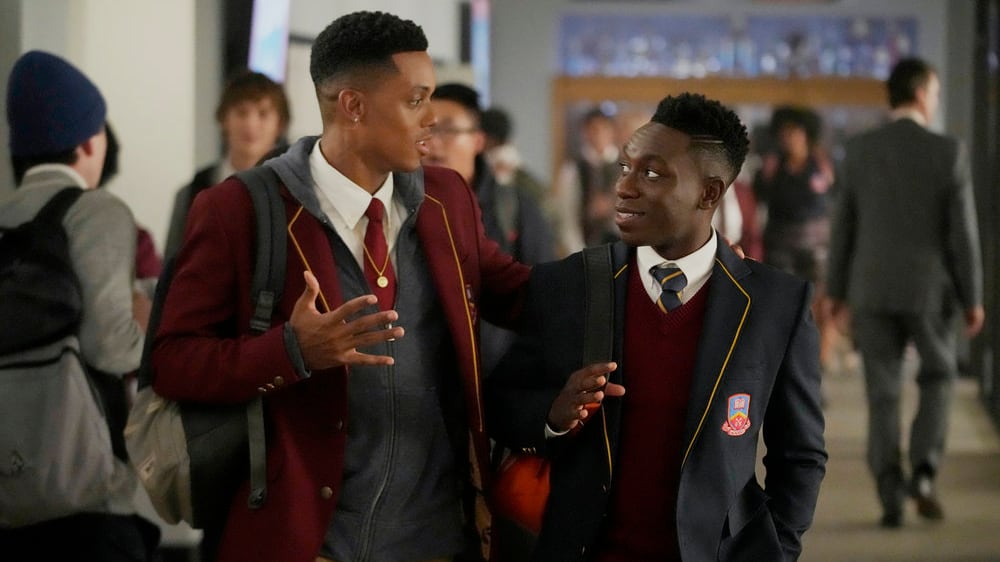Feeding our cultural obsession with “gritty” storytelling, Bel-Air presented itself as a darker, more authentic take on The Fresh Prince of Bel-Air when it premiered on Peacock last year. Ultimately, the reboot was more glossy than gritty, melodramatic but not really macabre. The episode’s conflicts and overall structure resembled a network soap rather than something intentionally provocative or experimental, like Euphoria.
It turns out, that’s a great thing. For the most part—certainly, in regards to ratings—those creative decisions and bucking those trends has been a recipe for success.
More than its actual source material, Bel-Air offers a certain nostalgia for addictive, adolescent dramas like The O.C, The CW’s 90210 and previous eras of Degrassi. In its second season, premiering on Feb. 23, it continues to scratch this itch. Once again, creator and executive producer Morgan Cooper and the show’s writers combine teen hijinks, family drama, and afterschool special-esque lessons in a way that’s compelling and not annoyingly didactic.
Season 1 culminated in a somewhat predictable fashion, as tensions between Will (Jabari Banks) and his family members at the Banks residence rose to a dysfunctional crescendo. Borrowing one of the original sitcom’s most famous storylines, Will’s estranged father (Marlon Wayans) made a surprising yet ultimately soul-crushing appearance in the finale, after Geoffry reveals his whereabouts against Uncle Phil’s (Adrian Holmes) wishes.

Will tearfully packed his bags and moved in with his cabby friend Jazz (Jordan L. Jones). However, like most fights between teens and their guardians, Will and his uncle eventually mend fences, and the formerly low-income teen returns to his family’s lavish estate to focus on earning a Division 1 basketball scholarship.
In its first four episodes, Bel-Air Season 2 further cements itself as the type of high-school drama more interested in tackling Big Issues than depicting the more frivolous aspects of teen life. Its inaugural season focused on socially conscious fare, addressing police brutality, intracommunal conflicts and respectability politics.
This time around, though, the show’s themes and characters’ interpersonal drama are woven together more seamlessly. The conflicts they face continue to reveal things about (some of) the show’s characters and their relationships to one another. Bel-Air excels where other series fail, making these plot points meaningful when they can often simply feel like lip service to the social ill of the month.
For instance, a major conflict occurs when one of Ashley’s (Akira Akbar) teachers at Bel-Air Academy, a Black woman, is terminated for adding a politically charged book dealing with race to her curriculum.
This controversy impacts other students, including Will and Carlton (Olly Sholotan). Ultimately, it re-exposes the philosophical divide between the two cousins, specifically their priorities and level of allegiance to their community. While it’s often easier to side with Will, the show displays both of their naivete and clumsiness when it comes to such serious matters without judgment. Carlton’s more conservative perspective is mostly presented as a symptom of his own fear.
Speaking of Carlton, the high-performing student and occasional antagonist of the series is still struggling with crippling anxiety and building genuine connections with his classmates that aren’t predicated on status, including his former flame Lisa (Simone Joy Jones).
The early episodes suggest some sort of breaking point or even a deeper conflict beyond his obsession with getting good grades. His character tends to pique your curiosity more than Will’s, who's constantly on the go and making moves towards his future. In this season especially, he feels like a ticking time bomb ready to explode.
Bel-Air unfortunately still struggles with giving its female characters the same level of intrigue. While the writers certainly make sure that the women of Bel-Air are preoccupied, mostly with work-related problems, these storylines aren’t nearly as compelling to watch as their male peers’ often intertwined drama.

For example, Aunt Viv (Cassandra Freeman)’s prestigious art fellowship proves to be less fulfilling than she imagined. In general, Viv’s aspirations are depicted in a perfunctory manner, seemingly to remind viewers that she’s more than just a housewife—as if that’s not a cinematically rich area of exploration. The moments where she’s conflicted as a mother or a wife prove to be more revealing about who she is than watching her respond to more straightforward problems within her profession. Overall, the show could do a better job of marrying her professional interests and her personal life, as it does so well with Phil.
The same could be said about Hillary (Coco Jones), who, upon ousting her previous male managers, essentially becomes the den mother of her own all-female influencer house. Portraying the largely idle everyday lives of social-media stars on-screen has proven to be a difficult task if not done through a hyper-specific lens.
And yet, the show doesn’t seem that familiar with the intricacies of the job or provide any insightful commentary. Watching Hillary compete with the more established Ivy (Karreuche Tran) makes this subplot slightly more engaging. But once again, it’s Hillary’s cute, budding romance with Jazz that captures your attention more.
Even with these opportunities for growth, Bel-Air succeeds as a satisfying soap that, so far, has yet to wane in its overarching narrative. Each episode feels like a trip down memory lane, back to the good ole days of The CW (or The WB) or the classic Black family sitcoms of the 20th century. There’s a warmth and familiar tone to each episode that almost makes it feel like you’re consuming a rerun of your favorite show. Even if it’s not exactly The Fresh Prince of Bel-Air, it still works.
Keep obsessing! Sign up for the Daily Beast’s Obsessed newsletter and follow us on Facebook, Twitter, Instagram and TikTok.







